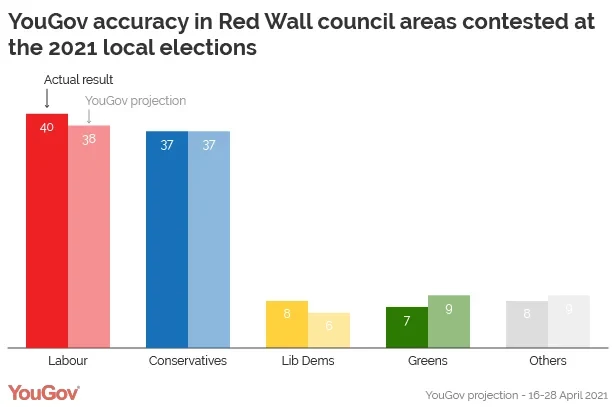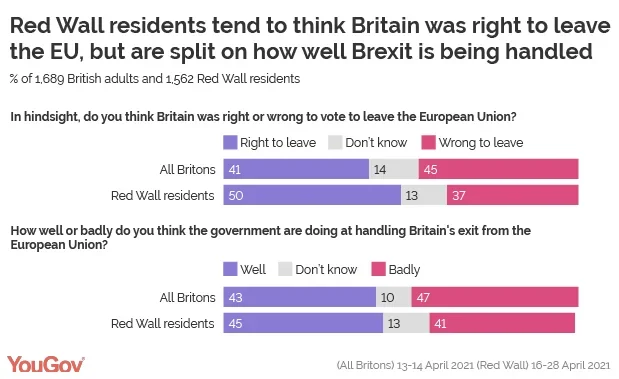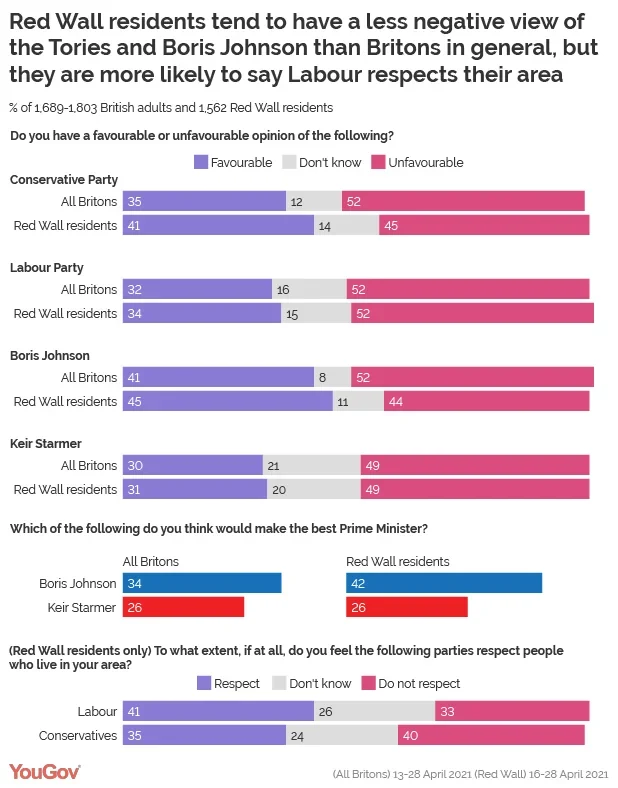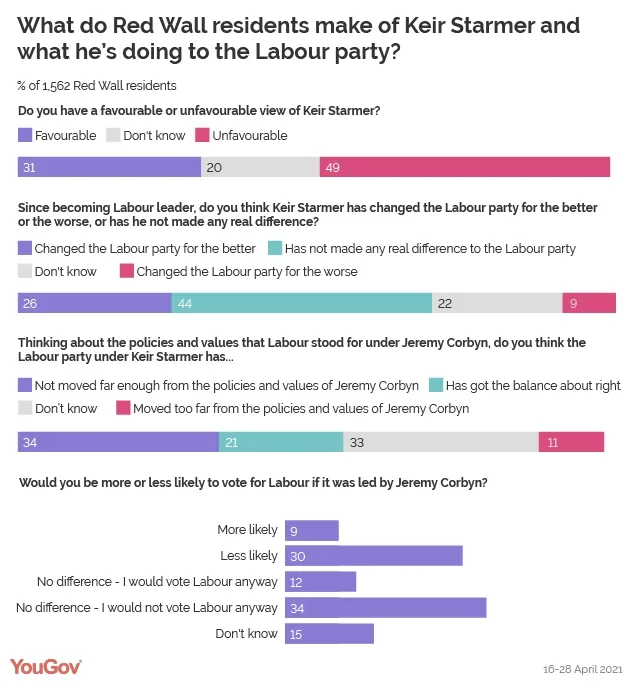YouGov data reveals support that people living in Red Wall constituencies look much like the rest of the country
The weekend before Super Thursday’s bumper set of local, mayoral, and devolved parliamentary elections, a major YouGov poll predicted that Labour were set to lose dozens of seats to the Conservatives in areas of the North and Midlands known as the ‘Red Wall’.

With Labour’s struggles in its former heartlands so evidently continuing, and questions remaining about how the party might go about winning back voters who previously supported them for generations, much attention is being paid to the motivations and beliefs of Red Wall voters.
Now, using a brand new YouGov poll of people living in 51 constituencies across the North, Midlands, and North Wales that the Conservatives won from Labour at the 2019 general election, we are able to reveal what the Red Wall thinks.
The Red Wall and Brexit
There have been many assumptions and stereotypes made about this highly politically salient group ever since the term ‘Red Wall’ was first coined and thrust into political terminology back in 2019.
For starters, people living in these previous Labour heartlands are argued to be strong supporters of Brexit, and indeed many of the constituencies included in the analysis voted heavily to Leave the European Union in the 2016 referendum.
Our survey found that Red Wall residents do indeed believe that Britain made the correct decision in voting to leave the European Union: half (50%) agree that the UK was “right to leave”, compared to 37% believing it was the “wrong” decision. One in eight (13%) are unsure.
In our latest polling of all British adults on the EU, we found that 41% of people think Britain right “right to leave”, versus 45% who felt it was “wrong”. Views on Brexit do indeed seem to be more positive in the Red Wall than among the population at large.
Red Wall dwellers are, however, split on how well the government has handled the country’s exit from the EU. While 45% of the Red Wall believe the country’s withdrawal from the EU has been handled very or fairly well, 41% think it has been handled very or fairly badly. Again, 13% did not know.

This suggests that while there is no lack of enthusiasm for Brexit in the Red Wall, there is no clear verdict on the government’s Brexit record.
Red Wall residents are slightly more positive in this regard than the population as whole, who are also split but with a slight lead in the opposite direction. We found that 39% of Brits think the government has handled Brexit “well”, versus 47% who believe they have handled it “badly”.
The Red Wall and the Conservatives
In terms of British political parties and their leaders, the stereotypical Red Wall citizen is thought to hold Boris Johnson in (relatively) high regard, and believe that the Labour Party no longer represents them.
This first perception is borne out by the data. Red Wall occupants are more favourable toward Boris Johnson (net favourability of +1) than they are to Keir Starmer (-18), and prefer the Conservative party (-4) to Labour (-18). They are also much more likely to think that Boris Johnson would make a better Prime Minister than Keir Starmer, by a margin of 42% to 26%.
However, people in the Red Wall are nonetheless more likely to think that the Labour party respects “people who live in your area” than the Conservatives. Four in ten (41%) say that Labour either somewhat or completely respect people in their area, while 33% say that they party tended not to.

On the other hand, while 35% of people say that the Conservatives tended to respect people who live in their area, 40% believe that they tend not to.
This finding somewhat contradicts ‘evidence’ from vox-pops and commentary on the underlying reasons for voters moving away from Labour in these constituencies. Perhaps focusing on the issue of respect for local communities could provide Labour with some cement in their bid to rebuild the Red Wall.
What do Red Wall voters think of Keir Starmer?
We also asked Red Wall residents for their views on Keir Starmer, and how he compares to the party’s former leader, Jeremy Corbyn. We found that they do not have a favourable opinion of him overall, people in these key political battlegrounds prefer the leadership and direction of Keir Starmer to that of his predecessor.
While 21% of the Red Wall feel that Starmer has “got the balance about right” between moving away from and maintaining the policies and values of the Labour Party under Corbyn, one in three (34%) feel that the current Labour leader has not moved far enough away. Only 11% felt that the Labour Party had moved “too far”.

More broadly, we found that one in four (26%) of the Red Wall believe that Starmer has changed the Labour party for the better, versus 9% who believe he has made the party worse. More (44%) believe he has not made any real difference, however. Meanwhile, 30% of those in Red Wall constituencies say they would be less likely to vote for the Labour Party if it were led by Mr Corbyn, versus 9% who say they would be more likely.
One of the most contentious flashpoints between Keir Starmer and Jeremy Corbyn was the latter’s suspension over his response to the Equality and Human Rights Commission’s report into anti-semitism in the Labour Party. We found that 57% of Red Wall residents felt it was the “right decision” to suspend Mr Corbyn, while only 16% believe it was the wrong move.
Red Wall residents on social and policy issues
In terms of social and policy issues, Red Wall residents are said to be patriotic and proud of English identity, and resistant to the kind of policies and movements that would attract “socially liberal voters”, such as “green and cultural issues”.
Most famously, Dominic Cummings is reported to have said that climate change “didn't matter to people in Red Wall seats”, and was instead “just an obsession of posh boys in southern seats”.
Likewise, voters in the Red Wall are, according to commentary by Professor Matthew Goodwin, instinctively “small c conservatives”, wooed by Boris Johnson’s appeals on “family, nation, tradition, and established ways of life”.
Analysis of British Election Study data by Dr David Jeffery cast doubt on the idea that Red Wall voters were particularly conservative or hostile to progressive, socially liberal movements and policies.
And now, YouGov data provides fresh and thorough new insights into social views in the Red Wall. Our survey shows that rather than being a bastion of social conservativism within Britain, these constituencies up and down the North and Midlands contain a great diversity of opinions, and indeed widespread support for a range of what we might consider progressive policies and views.
Furthermore, where Red Wall voters do exhibit socially conservative attitudes, they are not significant stronger (or no more common) than the level of social conservativism which we see among the British public in general.
In other words, the Red Wall is no more socially conservative than Britain as a whole, and characterisation of voters in these areas as predominantly “small c” conservatives concerned about social liberalisation or culture wars is not supported by polling evidence.
For instance, people in Red Wall areas are very much supportive of things like multiculturalism, with 50% agreeing that “having a wide variety of different ethnic backgrounds and cultures is part of British culture”, versus 31% who suggested that this undermined British culture.
Residents in these former Labour seats are, however, concerned about recent developments in race relations, with 48% believing that “there is an increasing amount of tension between the different ethnic groups in living in Britain”. That said, 27% believe that there is no such increasing tension. Most (58%) also believe that “British values are in decline”, versus 12% who believe them to be as “strong as ever”.
These figures are very similar throughout to findings from our nationally representative sample. Here, we found again that a majority (54%) agreed that having a wide variety of different ethnic backgrounds is part of British culture, versus one-in-four (27%) who believed that it undermined British culture. Secondly, 43% of British people agree that there was increasing tension between ethnic groups, while 30% believe that groups were getting along well. Similarly, 48% of Brits believe that British values are “in decline” versus 19% who think they are “as strong as ever”.
We did find a significant gap between residents of the Red Wall and Britain as a whole on the topic of immigration. Here, Red Wall residents are fairly split on their assessments, with a slight lean toward more positive views. While 40% agree that immigration has “generally been good for the country”, 33% believe that it has on the whole been a bad thing.
When we asked our nationally representative panel the same question, we found that 50% of Brits agree that immigration has on the whole been good, while a quarter (24%) believe on the whole it has been bad. While in both cases we find positive assessments of immigration to be most common, Red Wall residents are clearly less favourable toward immigration than Britain in general.
We also asked people in the Red Wall what their thoughts were about crucial recent points of contention in the so-called “culture war”, such as the censorship of online hate and abuse, transgender rights, and teaching of Britain’s colonial history and links to the slave trade in schools.
When it was suggested that the authorities ought to “do more to stop offensive and abusive comments and messages on the internet”, 52% of Red Wall residents agreed. This was in contrast to the 25% who supported the opposing suggestion that “free speech should be protected” and that it was neither practical nor desirable “for authorities to police offensive comments and abuse”.
Compared to the whole population, the figures are again very similar. In March, we found that 57% of Brits supported the suggestion that authorities should do more to police hate on the internet, while 25% said that protecting free speech ought to be the priority.
Red Wall residents are, however, much more likely to support the suggestion that “it is important that people are free to speak and act as they wish, as long as they do not hurt anyone” (56%) versus the statement reading “it is important to be wary of how your words and actions might offend or upset others” (29%). Again though, these figures are not altogether too dissimilar to the British population as a whole, where we found 50% of people in favour of the first statement versus 35% in favour of the second.
On transgender rights, 35% of the Red Wall agree that transgender women should be allowed to use female changing rooms, versus 28% who disagreed with this position (36% did not know or did not support either suggestion). Among the British public, these figures stand at 35% and 27% respectively (37% did not know or did not support either suggestion).
When it comes to whether schools should teach children about Britain’s colonial past and its role in the slave trade, 73% of the public in those Red Wall seats support this being part of the curriculum, with only 6% opposing. Amongst all Brits, these figures are 78% and 4% respectively.
The Red Wall has been characterised as a place of great patriotism and English pride. Certainly, our data found that 61% of residents there had a very or somewhat favourable opinion of people flying the English flag outside their home. Support for flag flying also extended to the Scottish (57%) and Welsh (59%) flags too.
When we asked the same question to our nationally representative panel in 2018, we also found that a majority (56%) of British adults held a favourable opinion of people flying or displaying the English flag outside their homes.
The Red Wall and climate change
On climate change, people in the Red Wall overwhelmingly believe that the world’s climate is changing as a result of human activity (72% believe this to be the case, 16% do not).They also believe that the risks of climate change are not being exaggerated (66%),
According to latest YouGov data, 75% of British adults believe that the world’s climate is changing as a result of human activity, and 67% do not think the issue is being exaggerated. Again, remarkably similar to views in the Red Wall.
Finally, Red Wall residents also want the government to take urgent action on the environment; 63% of them favour of the government making tackling climate change one of its top priorities.
So, rather than climate change being the preserve of rich southern liberals, it is also a big concern and a strong priority for voters in the Red Wall.
Conclusion
Overall, our polling shows there are some common assumptions and suggestions about Red Wall residents that are indeed true: they are in favour of Brexit, prefer Boris Johnson and his party to Keir Starmer and Labour, and do not view Jeremy Corbyn nor his leadership of Labour with much fondness.
However, there are certainly signs that the Red Wall may come back to Labour, and that Keir Starmer has improved evaluations on the Labour Party somewhat in these key electoral battleground areas.
Furthermore, there is nothing in our data to suggest that Red Wall voters are particularly socially conservative or especially concerned about progressive policies or social movements. In the majority of cases, we found more support for socially liberal attitudes than conservative attitudes, and where we did find support for socially conservative positions, this was not particularly out of step with the British population as a whole.
They are patriotic, but so are the majority of Brits. They are concerned with a perceived decline in “British values”, but no more so than the national average.
The Red Wall, it seems, is much more typical of British politics and British social attitudes than an extreme.










